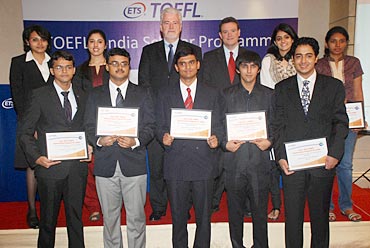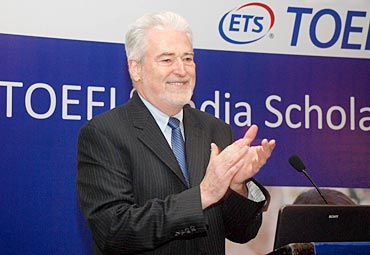Divya Nair
TOEFL toppers share their experience and offer quick tips on how to crack the test
Nine Indian students who received the prestigious Educational Testing Service (ETS) sponsored TOEFL India 2011 Scholarship recently in Mumbai were of the opinion that cracking the TOEFL is not that difficult as it seems.
How to crack the TOEFL
Test of English as a Foreign Language (TOEFL) is conveniently divided into four sections and aims to test the students on their efficiency at English language skills, namely Reading, Listening, Speaking and Writing. Some of the finalists share some useful tips with our readers on how to crack TOEFL.
Reading
"I had a keen interest to read. So that helped. You can read anything. There is no specific book or site to refer. The ETS resources are all you will need. They are very helpful," says Gaayathry Ravikumar (TOEFL score: 118) who has completed Chemical Engineering from National Institute of Technology, Trichy and plans to pursue Masters In Product Development at the University of California, Berkeley.
"Reading comprehension needs a lot of patience. It takes more time compared to other sections. You must first quickly browse through the given passage to have a fair idea of the content. Then, read the questions below the passage and go back and read more patiently so that you can answer the questions correctly," says Dinakar Ayalasomayajula, (TOEFL score: 112) who passed his class 12 from KD Ambani Vidyamandir, Jamnagar and intends to study Automotive Engineering at the Czech Technical University, Prague
"The more you practice, the more you read, the better equipped you will be to face the test," quipped Gaayathry.
Listening
The basic aim of this section is to test the applicant's listening skills. A conversation involving two speakers, a student and either a professor or a campus service provider is provided. Each conversation is allowed to be heard only once. Students may take notes while they listen and refer to their notes when they answer the questions.
Dinakar also tells us how TOEFL is different from GRE. He says, "While GRE tests you for your knowledge of words, TOEFL is about your understanding of the nuances in the words used in a conversation. Earlier, I used to take down notes of various details mentioned in the conversation. Later on, when I moved to the questions, I would realise that they are more interested to know how well you understood the conversation than what details were mentioned. Although it sounds difficult, it's easy to crack for anyone."
Speaking
"For beginners, you need to brush up your vocabulary skills. There is no escape. You can refer to the ETS website and start by reading and communicating with friends on a regular basis," says Apurva Bamezai (TOEFL score: 118) who works as a Research Analyst in the Poverty, Health and Nutrition Division at the International Food Policy Research Institute and plans to study MPhil in Development Studies at the University of Cambridge, UK.
"Since you have little time, you have to be specific about your sentences. Use short sentences; be quick and steady in expressing your ideas," suggests Sruthi Chandrasekaran (TOEFL score: 120/120), a student of Economics at Indian Institute of Technology (IIT) Madras who plans to study MSc in Comparative Social Policy at the University of Oxford, United Kingdom.
"Also, be clear in your language and diction. It is important that the person listening to you receives your message correctly. Be simple and direct," added Gayathry.
Writing
"You don't have to write long essays or reports. You have to just list down the important, and flow your thoughts in a good order. Use simple words that can be understood by everyone," said Dinakar.
"Attention to details, coherency of thoughts and grammatical accuracy are some of the skills that will help you sail through the exam. No matter how hard you practice, you just need to be focused at the time of taking the test," says Omkar Deshmukh (TOEFL score: 112), a student of engineering at IIT Bombay who plans to study MSc (Computer Science) at the School of Computer Science at McGill University in Canada.
"Clear your mind before the test; everything is answered best when you begin on a fresh page," says Pradhayani (TOEFL score: 115) who is currently employed at Robert Bosch, India and will be attending the Delft University of Technology in Netherlands to pursue her major in Embedded Systems.
"As long as your English is comprehensive enough to handle the four different sections of the test, you need not worry. Two weeks of efficient practice should be more than enough to get you the score you want," shares Naveed Kanijiyani (TOEFL score: 114), who passed class 12 from Podar International School, Mumbai and aspires to study Mechanical Engineering at the University of Toronto in Canada.
Click NEXT for more
Indian students feature among the Top Five
Image: Dr. Walt MacDonald, Executive Vice President, ETSMeanwhile, Dr. Walt MacDonald, Executive Vice President, ETS spoke in depth about the sampling of ETS test, the efficiency of the results and more. Excerpts from the interview
What parameters do you consider while devising the TOEFL test?
We at ETS intend to make the TOEFL test as easy and simple as possible. Our motto is: Listening, Learning, Leading. We try to attain the same. Our test is recognised by over 8000 colleges from UK, US, Canada and Australia. We first talk to these Universities and try and understand what they expect from students who apply to them.
Further to our overall understanding of the demands of these educational institutions, we devise our questions such that they will test the ability of students in four basic elements of communication-reading, writing, speaking and listening. The questions are written and edited by a knowledgeable team of experts who conduct efficiency sampling before finalising the questions.
Since students from various countries with various educational backgrounds take the test, how does ETS ensure that the questions will be fair to all?
The test aims to understand the student's proficiency of English as a communicative language tool. The questions are so simple that anyone can take the test. Your education or country of residence doesn't really matter.
The questions are the same across all nations and since we are a non-profit organisation, we do not represent or cater to any educational institute or organisation. Our results are based on the performance of the student and rely purely on merit.
In your opinion, how equipped are Indian students who take the test?
The equability of performance among Indian students is visible across all sections of English communication they have scored 23 in each section adding to an average total of 92 out of 120.
I must say, that's very commendable and a great sign of improvement over the last few years. Even if you check the scores in the recent years, Indian students feature among the Top Five countries sharing space with students from US, China and the like.
What kind of resources do you offer to students who register with you?
Once you register with us, we have a lot of trainers who offer tips and suggestions to students from time to time. We also conduct free workshops and free sample tests online.
This year, we also started a toll free number exclusively for Indian students, which is available from 9am to 5pm so that students can avail of the facility and clear their doubts or queries regarding TOEFL exams.
The ETS website is a great source of reference material. There are so many online resources available on the website from video demonstrations to tips from experts offering guidance on how to take the test.
What tips would you like to offer to students who aspire to take TOEFL?
Practice! Practice! Practice! All kinds of resources are available online at your disposal. Use them appropriately and you will score well.



Comment
article